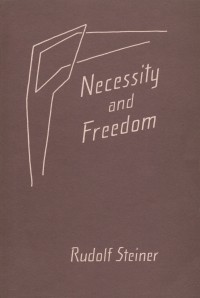Necessity and Freedom
GA 166

Rudolf Steiner illuminates the questions of freedom and necessity, guilt and innocence. Into this theme Steiner weaves questions of evolution, history, and culture, showing how and where human beings carry responsibility for these developments.
Steiner states that, whereas the human I is revealed in acts of volition on the physical plane, ultimately we will find our true I-being only through the Christ impulse and the completely free act of the Mystery of Golgotha.
This volume, Necessity and Freedom, is published in German as, Notwendigkeit und Freiheit im Weltengeschehen und im Menschlichen Handeln, (vol. 166 in the Bibliographic Survey).
The Graphic form on the cover of this book was created by Rudolf Steiner in 1921. The title lettering is by Peter Stebbing.
| Publisher's Note | ||
| Lecture I | January 25, 1916 | |
| The past shows us a picture of necessity. The future leaves the possibility open for freedom. Kant's antinomian chart. Limitation of logic when we approach infinity. An example with numbers. The Prague clock. Every external event has an elemental one underlying it. What is true on the physical plane often looks different on the spiritual plane. Beings are active on the elemental plane. In the physical realm things can be proved, whereas in the supersensible realm they are perceived. Mystery of Golgotha a free deed. Haeckel and the war. | ||
| Lecture II | January 27, 1916 | |
| The legend of the Prague clock and the workings of Ahriman and Lucifer. Law of cause and effect applies in the physical world. Historical events must be judged according to their intrinsic value. A condemnation of Goethe's Faust. Freedom and necessity mingle in human actions. Nature once a free deed of the gods. Past thoughts of the gods appear to us as necessity. Our present life of thought will be the outer nature of the future. | ||
| Lecture III | January 30, 1916 | |
| Illustration of three teachers with different attitudes to life, one is ahrimanic, another luciferic, and the third takes the path of progressive development. We must get to know the hidden forces behind ongoing events. Our actions can be influenced by pre-birth experiences. Two things combine in human beings, the stream of heredity and the spiritual part. Learning from life strengthens us. | ||
| Lecture IV | February 01, 1916 | |
| Conflict of the Roman world and Teutonic tribes as basis of further historical development. Incursion of spiritual impulses in historical events. Unsuccessful actions are also necessary. Punishment as an enhancement of consciousness. Faust as an evolutionary factor. Greatest freedom involved in performing what is a necessity in world history. Empty space in world processes for certain impulses. Essential part of the will of angels is the intention. The animal in us as the cause of crime. Spiritual science now necessary, yet we can take it up in freedom. Right intentions lead to right results. | ||
| Lecture V | February 08, 1916 | |
| The I is found on the physical plane in acts of will. In the Middle Ages people still experienced auras. In the future the world will look bleaker and the will, will have less strength. Spiritual science will bring consciousness of the aura and a strengthening of will. Human beings in the grip of dreaming and ecstasy. Necessity of developing thinking and willing. The true I found through the Christ impulse. We shall then have memory of past lives. | ||

